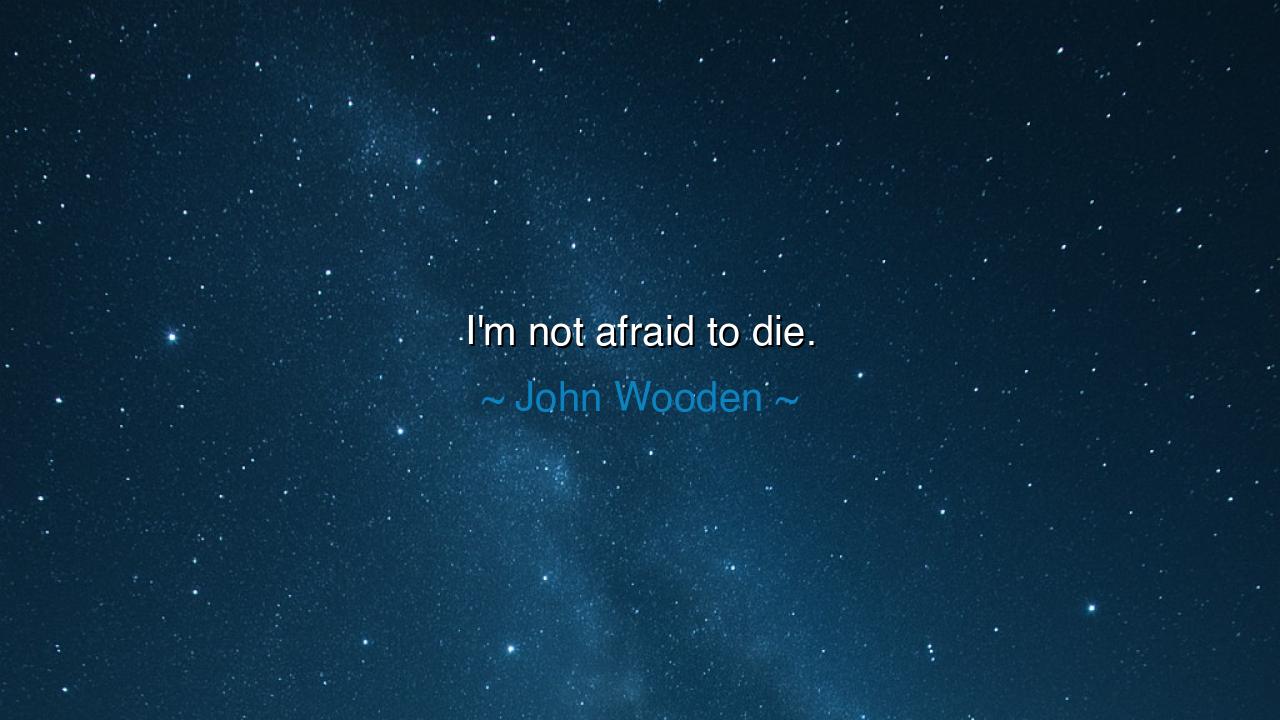
I'm not afraid to die.






When John Wooden said, “I’m not afraid to die,” he did not speak as one seeking comfort, nor as one resigned to fate. He spoke as a man who had lived rightly, who had walked his path with integrity, love, and purpose. In his words, there is no arrogance, only peace—the quiet peace of one who knows that death is not an enemy to be feared, but a companion that arrives when life’s lessons are complete. Wooden, known as the “Wizard of Westwood,” was more than a legendary basketball coach; he was a philosopher of the human spirit. His greatness did not lie in his victories alone, but in the clarity of his soul, in his understanding that to live fully is to be prepared, at any moment, to let go without regret.
The origin of this quote reflects the final wisdom of a man who had lived in harmony with his beliefs. Wooden often spoke about life’s transience and the importance of character over fame, virtue over success. He lived by the teachings of his faith and by the principles his father had instilled in him: honesty, humility, patience, and love. As he grew older, he lost his beloved wife, Nell, and spent the rest of his days writing her love letters every month until his own passing. In that act—simple, faithful, and tender—lay the essence of his fearlessness. Death, for him, was not an end but a reunion. His words, “I’m not afraid to die,” came from a place of completion, from the calm that comes when one’s life has been lived with sincerity and devotion.
To say “I’m not afraid to die” is not to glorify death, but to affirm life. It means one has lived in such a way that nothing essential remains undone. Fear of death, as the ancients knew, often springs from the fear of an unlived life. The Stoic philosopher Seneca wrote, “He who has learned how to die has unlearned how to be a slave.” For to live constantly in fear of death is to never truly live at all. Wooden’s life embodied this freedom. He trained his mind and his players not to fixate on outcomes but to focus on effort, on excellence of the soul. He said, “Success is peace of mind, which is the direct result of self-satisfaction in knowing you made the effort to become the best of which you are capable.” Such peace is the soil from which fearlessness grows.
The ancients, too, revered those who met death not with trembling, but with serenity. Socrates, condemned to drink the hemlock, faced his fate with calm acceptance. When asked if he feared death, he replied that no man of wisdom should fear what he does not understand. His courage was not recklessness but trust in the order of existence—the belief that life and death are both part of the same divine rhythm. Wooden, though living centuries later, shared this same faith. He saw his time on earth as a preparation, each act of kindness, patience, and humility a step closer to eternity. He believed that when the time came, the soul would cross over not into darkness, but into light.
Wooden’s words also remind us of the power of moral readiness. To not fear death, one must live each day in accordance with conscience. Regret is the heaviest weight a dying man can bear, but those who have lived by truth carry no such burden. Wooden taught his players that “character is what you do when no one is watching,” and this principle extended to his own mortality. He lived by discipline, yet with gentleness; he achieved greatness, yet remained humble. His peace with death was the natural result of a life spent in alignment with virtue. He did not need to bargain with time, for his time had already been spent wisely.
Yet there is a profound tenderness in his courage. Wooden did not seek death, nor did he speak of it with defiance. His fearlessness was not born of hardness but of faith—faith in the continuity of love, in the immortality of goodness. The letters he wrote to Nell were not laments of loss, but affirmations of devotion that outlived the body. His example teaches that love, lived purely, makes even death seem gentle. He was not afraid because he had already experienced something eternal through his love, his teaching, and his integrity. In that, his heart was already immortal.
So, my children of the fleeting world, remember this: to be unafraid of death, one must first be unafraid of life. Do not wait until the end to seek peace—build it now, through daily acts of honesty, compassion, and courage. Live so that when death comes, it finds you whole, not half-finished. Be diligent in your work, faithful in your relationships, and kind in your thoughts. For when the heart is pure and the conscience clear, there is nothing to fear. Death cannot conquer one who has lived with purpose, for such a soul has already transcended it. As John Wooden showed us, the end of life is not to be feared, but embraced as the final victory of a life well lived—a victory not of trophies or fame, but of the spirit’s quiet triumph over fear itself.






AAdministratorAdministrator
Welcome, honored guests. Please leave a comment, we will respond soon